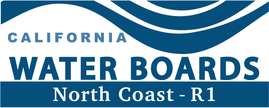Forest Activities Program
Overview
The Forest Activities Program of the North Coast Regional Water Quality Control Board (Regional Water Board) addresses nonpoint source (NPS) discharges associated with the use of our forested landscapes. Forest use activities with the potential to discharge sediment and remove stream shading primarily include: timber harvesting, fuels management, vegetation management, salvage logging and post-fire impacts, road construction, livestock grazing, and recreational use. Regulating potential water quality impacts from these forest use activities is consistent with the abundance of timber, rainfall, water resources, sensitive geologies, and threatened and endangered salmonid species in the North Coast Region.
Our forested watersheds are of significant economic importance, providing a source of water supply, timber, fisheries, and recreational use, while supporting a diverse array of both terrestrial and aquatic species, including several threatened and endangered salmonid species. Potential impacts from land disturbing activities in our forests include sediment discharges from felling trees; yarding and hauling of logs; road construction and reconstruction; watercourse crossing construction, reconstruction, or removal; livestock grazing; herbicide applications; and road use and maintenance. Impacts to stream temperature can result from removal of vegetation providing shade to streams. These activities can impact the beneficial uses of water by: 1) silting over fish spawning habitats; 2) clogging drinking water intakes; 3) filling in pools creating shallower, wider, and warmer streams, and increasing downstream flooding; 4) creating unstable stream channels; 5) losing riparian habitat and function; and 6) increasing stream temperatures.
Some forest use activities have the potential to positively affect the beneficial uses of our surface waters. Timber harvesting and fuels reduction operations provide an opportunity to decommission replace or reconstruct legacy roads which are frequent sources of chronic sediment inputs to surface waters. Fuels reduction projects can assist in reducing wildfire severity and thus can reduce post-fire sediment discharges. Mitigation and restoration work can provide opportunities for addressing legacy erosion sites and removal of fish migration barriers.
Permitting
The Regional Water Board is responsible for enforcing the Porter-Cologne Water Quality Control Act (Act), the Water Quality Control Plan for the North Coast Region (Basin Plan), and permits that have been issued on forest use projects. The Act and the Basin Plan prohibit the discharge of materials that adversely affect the beneficial uses of the waters of the State. The Regional Water Board has the authority to take enforcement action, ranging from a Notice of Violation to issuing administrative civil liabilities (fines) against persons who violate the Act, the Basin Plan, or a permit.
The Regional Water Board has developed several permits (i.e. Waste Discharge Requirements (WDRs) or Waiver of Waste Discharge Requirements (Waivers)) for addressing NPS discharges associated with forest management activities on both private and US Forest Service lands. These permits and the processes for project approvals and permit issuance can be found under the Private Forest Land and Federal Lands links.Other Program Activities
- Participation in the Timber Regulation and Forest Restoration Program (TRFRP)
Regional Water Board forest activities program staff are members of the TRFRP leadership team and various working groups. TRFRP provides statewide guidance to a variety timber harvest related activities, including regulation, interagency coordination, restoration, grants, monitoring, improving efficiencies, training, etc.
- Participation in CAL FIRE Review Team Process
Regional Water Board program staff coordinates with CAL FIRE in the review of timber harvest projects submitted for non-federal lands. Detailed review and field inspections by regional board staff are reserved for those projects that appear to pose the greatest threat to water quality. This effort constitutes a proactive approach to prevent timber harvest related impacts on water quality and assists in educating the timber industry of the need to implement additional management measures (beyond those required by the Board of Forestry’s Forest Practice Rules) where necessary to comply with Porter-Cologne, our Basin Plan objectives, and Total Daily Maximum Load requirements.
- Participation in the California Board of Forestry Committees and Rule Making Process
Program staff attend select Board of Forestry committee and regular meetings where proposed rule changes relating to water quality protection are drafted and then considered for adoption.
- Coordination with the State Water Board, CAL FIRE and Other Regional Boards
Staff works closely with the State Water Board and other regional boards to coordinate review and oversight of forest activities, comment on proposed legislation, and communicate regularly on issues with the potential to affect the program.
- Outreach To Industry and Watershed Groups
Staff works with local watershed groups to address concerns regarding water quality issues associated with forest activities. Staff also communicates with the regulated industry by speaking at conferences and industry group meetings.
- Enforcement Actions
Staff initiates enforcement actions in the form of Notices of Violation for corrective actions, Cleanup and Abatement Orders, or civil penalties for those activities that violate WDR or Waiver conditions and threaten to adversely affect water quality. - EMERGENCY PERMITTING FOR POST-FIRE TIMBER SALVAGE OPERATIONS – North Coast Water Board guidance document for landowners, registered professional foresters, and licensed timber operators regarding permitting and water quality requirements for post-fire timber salvage projects that have been authorized by the California Department of Forestry and Fire Protection (CAL FIRE).



